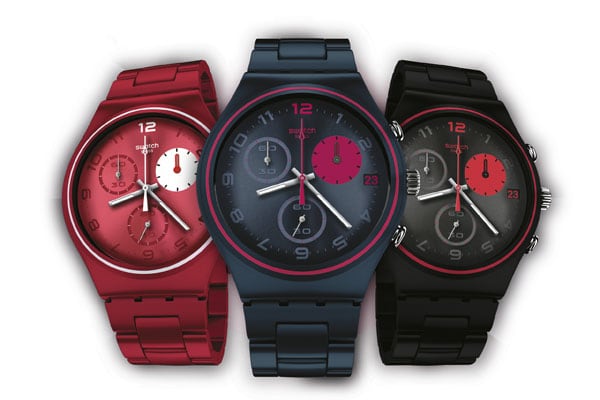The Times They Are A-Changin'
Swiss Watch offered a glimpse of some game-changing trends in watch making


Baselworld has a tendency to overwhelm your brain with so much information—brands, watches, designs, people, conversations—that after a couple of days, it’s very easy to miss the wood for the trees. We had to really work hard to isolate some of the larger and more strategic trends that have the potential to change the course of the industry.
The Chinese Onslaught
The Chinese are today by far the largest buyers of Swiss watches—within China, in Hong Kong and across the world as tourists—accounting for over 30 percent of annual Swiss exports. Using this massive market as a base, Chinese watchmakers, already the largest watchmakers by volume globally, are attempting to move up the value chain. In some ways it will be an Asian redux of the Japanese quartz attack. “The Chinese will do something the Japanese didn’t back then—use the size of their own market to provide critical mass to brands, and internationalise their management faster and better than the Japanese ever did,” says Yashovardhan Saboo, the head of India’s largest watch retailer Ethos.
The Focus on ‘Manufacture’
The Swatch Group’s decision to curtail supplies of movements and other critical components to competing watchmakers has put the spotlight firmly on ‘manufacture’. In mechanical watchmaking terms, that’s the ability of a brand to produce all or a few of its movements and components in-house instead of buying them from suppliers. Expect most large brands to invest tens of millions of francs on vertical integration—developing and mass-producing movements and other components. As they implement this, their marketing will start to reflect those.
Independents Squeezed
It’s a very tough time to be an independent watchmaker doing a fairly decent volume of business. The Swatch Group is reducing its movement and component supplies, the Swiss authorities are tightening ‘Swiss Made’ rules and preventing watchmakers from sourcing foreign supplies, the global economy is slipping further into a funk, and there is a dearth of capital or investors. The squeeze will especially hit brands in the $1,000-3,000 price category. Many will need to shift more of their catalogue towards quartz and suffer lower profit margins (because prices for ETA movements will only go up). Some will sell out, others will close down. The Evolution of ‘Swiss Made’
The Evolution of ‘Swiss Made’
Watchmakers can inscribe ‘Swiss Made’ on their watches as long as they use Swiss-bought components worth over 50 percent of the watches’ value. But the large Swiss watchmakers, led by the Swatch Group, have been lobbying to change that: They want the ‘Swiss Made’ tag to be used only if 80 percent of the components are Swiss. This would drastically reduce the playing field for not just foreign brands but also smaller and cheaper Swiss brands who have no option but to source some of their components from China to keep costs low. While 80 percent appears unlikely, 60 percent is almost certain after the Swiss National Council approved it.
Swatch vs. the Rest
As Swatch simultaneously increases production and cuts supply of critical watch movements to competitors, the biggest gainers will be its mid-segment brands like Rado, Tissot and Hamilton.
In the premium segment, volumes are small enough and profits high enough for competitors to either pay higher prices for third-party movements or to set up their own manufactures. With Omega having done a fairly successful job of regaining the premium positioning it enjoyed till the 1980s, that leaves space for Longines to move up and occupy the space Omega held. Things are looking good for Swatch in the short to medium term, but there’s no saying how the global economy will turn out, or what happens if its competitors are able to outfox it with better industrial manufacturing of components.
First Published: Jul 10, 2012, 05:31
Subscribe Now